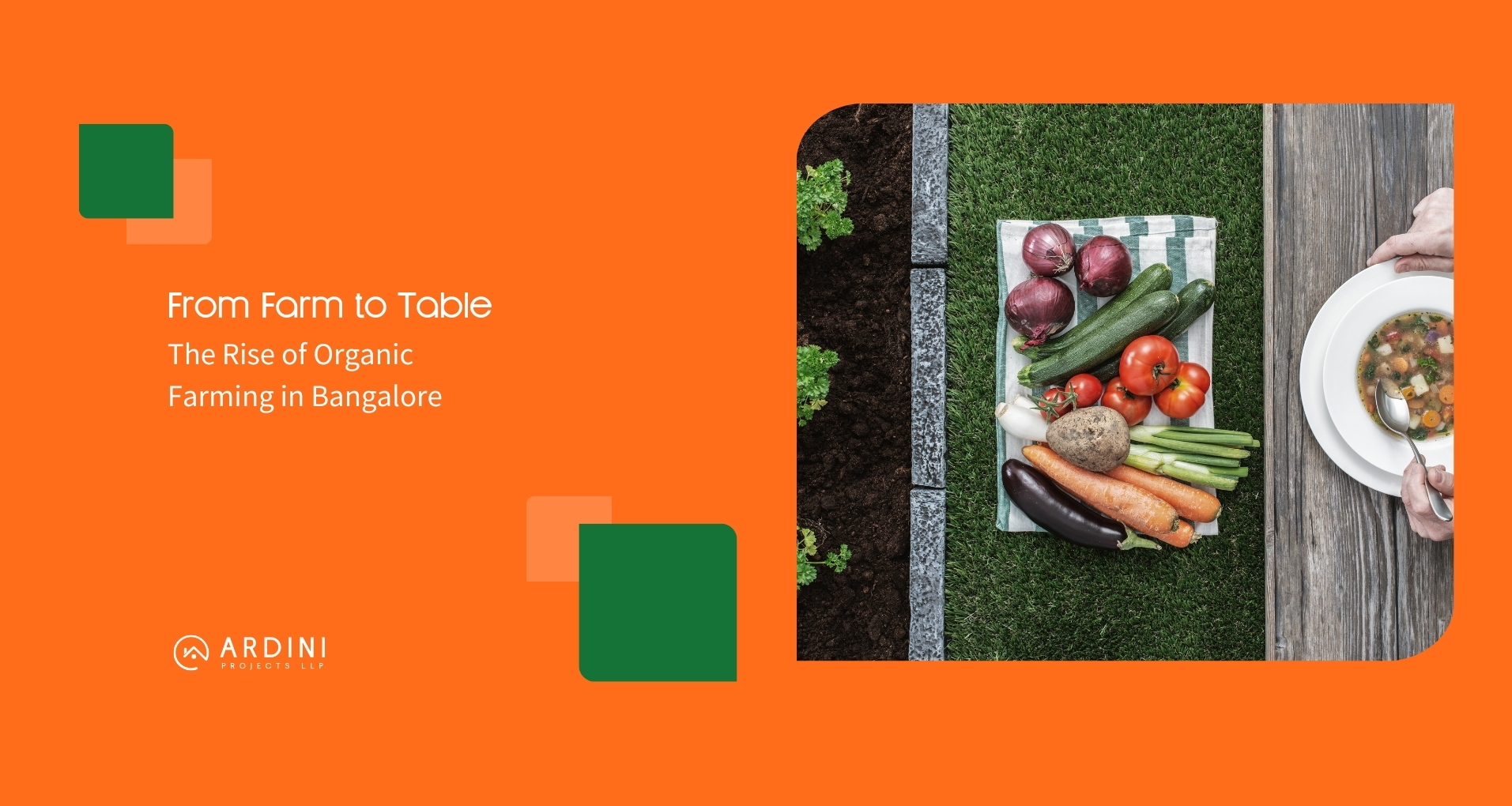The Rise of Organic Farming in Bangalore: From Farm to Table

Organic farming in Bangalore is on the rise, adding a refreshing trend to the bustling city renowned for its innovation and technology. This shift towards sustainable practices isn't solely about cultivating healthy food; it's about nurturing a greener future for the city and its residents. Let's delve deeper into this burgeoning movement and explore the exciting possibilities it unlocks.
A Growing Appetite for Organic Produce
Gone are the days when organic food was merely a niche market option. Today, Bangaloreans are increasingly seeking fresh, wholesome produce grown using natural methods. This growing demand is driven by a heightened awareness of the health benefits of organic food, which is free from harmful chemicals and pesticides.
Imagine enjoying a delicious meal knowing your ingredients were cultivated with care for the environment. Day outings in Bangalore have taken on a new meaning, with residents visiting local farms to witness organic practices firsthand and connect with their food source.
Organic Farming: A Boon for the Environment
The benefits of organic farming go far beyond the dinner table. By adopting organic methods, farmers contribute significantly to environmental conservation:
- Preserving Soil Health: Organic practices like crop rotation, cover cropping, and composting enrich the soil, promoting healthy microbial activity and improving its ability to retain water. This creates a fertile ground for diverse plant life, naturally boosting agricultural productivity.
- Promoting Biodiversity: Organic farms create havens for pollinators like bees and butterflies, which are essential for healthy ecosystems. This biodiversity fosters natural pest control mechanisms, reducing reliance on chemical pesticides.
- Combating Climate Change: Organic farming techniques minimize soil disturbance and promote carbon sequestration, helping mitigate climate change’s effects.
Ecowood Habitat: Cultivating a Sustainable Future
Ecowood Habitat by Ardini Projects LLP stands as a testament to Bangalore’s growing commitment to sustainable living. This gated community, nestled amidst serene nature, offers residents the opportunity to invest in agricultural land in India while making a positive environmental impact.
Here's how Ecowood Habitat embraces organic practices
- Focus on Organic Produce: Ecowood Habitat prioritizes cultivating various organic fruits, vegetables, and even the prized red sandalwood tree (also known as the red chandan tree or sandalwood plant).
This not only ensures a healthy food source for residents but also promotes sustainable sandalwood farming, a unique and eco-friendly alternative. The red sandalwood tree price can vary depending on its age and quality. However, investing in red sandalwood at Ecowood Habitat offers the potential for long-term financial returns alongside environmental benefits. - Sustainable Water Management: Techniques like rainwater harvesting and drip irrigation are employed to conserve water, a precious resource in India.
- Composting and Manure Management: Organic waste is composted and used as natural fertilizer, promoting soil health and reducing reliance on synthetic solutions.
Beyond Organic: A Wellspring of Sustainable Living
Ecowood Habitat offers more than just farmland in Bangalore for investment. Imagine owning a farm stay near Bangalore, a peaceful retreat where you can reconnect with nature and experience the joys of organic farming firsthand. Furthermore, explore the verdant landscapes, witness the diverse wildlife, and savor the taste of freshly harvested organic produce—all within easy reach of the city.
Investing in a Greener Tomorrow
Investing in managed farmland at Ecowood Habitat promotes organic practices and supports a sustainable future.
- Supporting Sustainable Practices: Your investment supports organic farming in Bangalore, promoting a healthier environment.
- Reducing Your Carbon Footprint: Choosing organic produce and sustainable farming reduces your overall environmental impact.
- Building a Legacy: You join a movement for a sustainable food system, leaving a positive legacy for future generations.
The Future of Organic Farming in Bangalore
The rise of organic farming in Bangalore signals a promising future. With growing consumer demand for healthy, sustainable food, organic practices will soon become the norm. This shift to greener farming can foster a healthier city, vibrant ecosystems, and a sustainable future.
Join the movement for a greener Bangalore. Explore managed farmland at Ecowood Habitat and embrace organic living. Remember, small choices matter. Choose wisely, choose organic, and secure a sustainable future.
A Closer Look at Organic Farming Techniques
Organic farming in Bangalore employs a variety of techniques to ensure sustainability and health benefits:
- Intercropping: Growing two or more crops in proximity to promote synergistic interactions. This practice enhances biodiversity and soil health.
- Mulching: Covering the soil with organic materials to retain moisture, regulate temperature, and reduce weed growth.
- Natural Pest Management: Using biological control methods, such as introducing beneficial insects that prey on pests, to minimize chemical pesticide use.
- Seed Saving: Preserving heirloom seeds from season to season to maintain genetic diversity and resilience in crops.
The Role of Technology in Organic Farming
While organic farming emphasizes natural methods, technology still plays a crucial role:
- Precision Agriculture: Utilizing GPS and satellite imagery to monitor crop health, soil conditions, and irrigation needs, ensuring optimal resource use.
- Mobile Apps: Farmers use apps to access real-time information on weather patterns, pest outbreaks, and market trends, aiding in informed decision-making.
- Renewable Energy: Solar panels and wind turbines are increasingly used on organic farms to reduce reliance on fossil fuels and lower carbon footprints.
Community Involvement and Education
Organic farming in Bangalore thrives on community support and education:
- Farmers’ Markets: Local markets provide a platform for organic farmers to sell their produce directly to consumers, fostering a sense of community and trust.
- Workshops and Training: Regular workshops educate farmers and enthusiasts about organic practices, sustainable living, and the benefits of organic produce.
- School Programs: Introducing organic farming concepts in schools encourages young minds to appreciate and adopt sustainable practices from an early age.
Challenges and Solutions
Despite its benefits, organic farming in Bangalore faces challenges:
- Higher Costs: Organic farming can be more labor-intensive and require more expensive inputs. However, the long-term benefits to health and the environment justify these costs.
- Market Access: Small-scale organic farmers may struggle to access larger markets. Cooperative models and direct-to-consumer sales can alleviate this issue.
- Climate Vulnerability: Organic farms are sensitive to climate variability. Diversifying crops and adopting resilient practices can help mitigate risks.
Challenges and Solutions
Despite its benefits, organic farming in Bangalore faces challenges:
- Higher Costs: Organic farming can be more labor-intensive and require more expensive inputs. However, the long-term benefits to health and the environment justify these costs.
- Market Access: Small-scale organic farmers may struggle to access larger markets. Cooperative models and direct-to-consumer sales can alleviate this issue.
- Climate Vulnerability: Organic farms are sensitive to climate variability. Diversifying crops and adopting resilient practices can help mitigate risks.
Success Stories from Bangalore's Organic Farmers
- Green Earth Organic Farms: This farm focuses on a diverse range of organic vegetables and fruits. Their commitment to sustainability has earned them a loyal customer base in Bangalore.
- Sampoorna Ahara: An initiative that delivers fresh, organic meals to Bangaloreans, showcasing the direct benefits of organic farming to urban residents.
- The Organic World: A retail chain that sources produce from local organic farms, making organic food accessible to a broader audience in the city.
How You Can Get Involved
Whether you’re a consumer, investor, or aspiring farmer, there are many ways to support organic farming in Bangalore:
- Choose Organic: Make a conscious effort to buy organic produce and products, supporting local farmers and reducing your carbon footprint.
- Invest in Organic Projects: Consider investing in initiatives like Ecowood Habitat, which promote sustainable practices and offer long-term benefits.
- Volunteer or Intern: Get hands-on experience by volunteering or interning at organic farms, learning about the practices and challenges firsthand.
Conclusion:
The rise of organic farming in Bangalore is more than a trend—it’s a movement towards a healthier, more sustainable future. By embracing organic practices, Bangaloreans are contributing to environmental conservation, improving their health, and fostering a sense of community. As organic farming continues to grow, it promises to transform the city’s landscape and inspire others to follow suit.
Join the movement for a greener Bangalore. Explore managed farmland at Ecowood Habitat and embrace organic living. Remember, small choices matter. Choose wisely, choose organic, and secure a sustainable future.
Organic farming in Bangalore is not just a path to healthier living but a commitment to a sustainable and vibrant future. Be part of this transformation and witness the positive impact it can have on our lives and our planet.
- Tags : Organic Farming, Sustainable Farming
